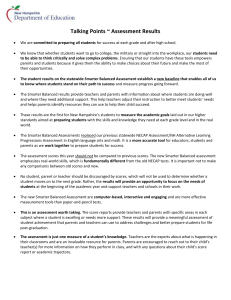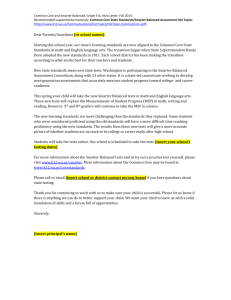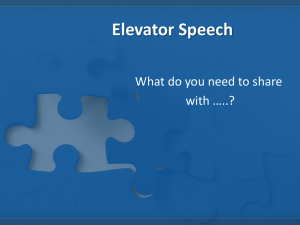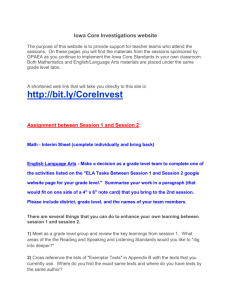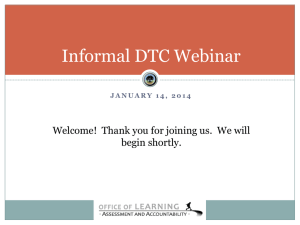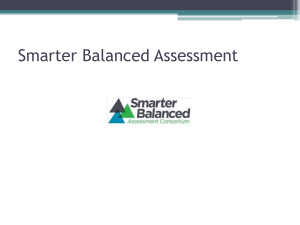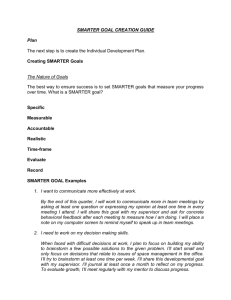Using the Summary PowerPoint - Oregon Department of Education
advertisement
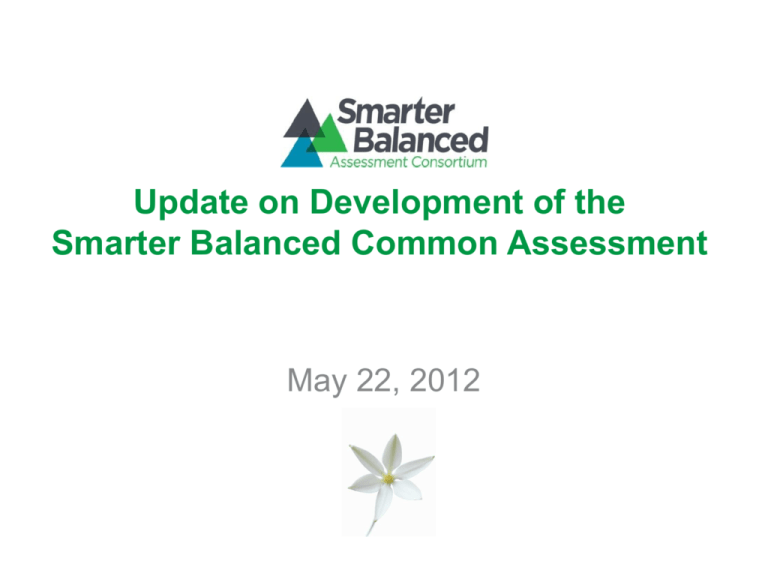
Update on Development of the Smarter Balanced Common Assessment May 22, 2012 • Welcome, the webinar will begin at 2:30 Pacific. • Please mute your audio so that your personal conversation is not heard by others. • Please use “Chat” to ask that a question be addressed. 2 • • • • • Introduce Oregon staff engaged with Smarter Welcome participants and guest, Tony Alpert Quick Background (Kathleen Vanderwall) Policy Updates (Derek Brown, Holly Carter) Transition Plans (Derek Brown, Ken Hermens, Jim Leigh) • • • • Item Writing Opportunities (Kathleen Vanderwall) Summer Assessment Institute (Holly Carter) Timeline, Pilot and Field Test (Tony Alpert) Open Questions 3 Quick Background Kathleen Vanderwall Manager, Test Design Oregon Adopted CCSS Superintendent of Public Instruction Susan Castillo “By joining other states in the Common Core movement, we better position our students to compete nationally and internationally with their peers for jobs in the 21st century workplace.” Oregon Board of Education adopted Mathematics and ELA & Literacy CCSS in October 2010 Operational Assessment begins 2014-2015 www.ode.state.or.us/go/commoncore Oregon is a governing member of SBAC One Aspect of the Summative Assessment The SMARTER Balanced Mandatory comprehensive Assessment Consortium accountability measures (SBAC) is one of two that include computer multistate consortia adaptive assessments and awarded funding from the performance tasks, U.S. Department of administered in the last 12 Education to develop an weeks of the school year in assessment system based grades 3–8 and high school on the new Common Core for English Language Arts State Standards (CCSS). (ELA) and mathematics http://www.smarterbalanced.org CCSS Implementation in Oregon Stewardship and Policy Teams CCSS implementation efforts require a group of committed individuals that represent all sectors of education in order to achieve the overarching Common Core goal: every Oregon student College and Career-ready. Called the Stewardship Team, this group consists of 39 stakeholders, identified through a statewide nomination process, and appointed by the Superintendent of Public Instruction. Policy Team made up of 20 stakeholders meeting first on June 4th. Membership includes • K-12 and postsecondary educators in English language arts, mathematics, science, social science, and career and technical education • Early childhood educators, • ESD staff • Faculty from colleges of education (teacher preparation) • Special education and English Language Learner directors • Representatives from business, Oregon PTA, and professional educational organizations 1 Accessibility and Accommodations 2 Formative Assessment Practices and Professional Learning 3 Item Development 4 Performance Tasks 5 Reporting 6 Technology Approach 7 Test Administration 8 Test Design 9 Transition to Common Core State Standards 10 Validation and Psychometrics Oregon Workgroup Members Advising Smarter Balanced 8 • Mark Freed Reporting Co-Chair • Steve Slater Validation and Psychometrics Co-Chair • Kathleen Vanderwall Item Development Member • Rachel Aazzerah Test Administration Member • Jim Leigh Transition to the Common Core Member 9 • Smarter Balanced is meeting key milestones and is within budget. • New hardware purchasing guidelines provide specifications for computers and tablets. • Test design simulations begin to fill in outline of assessments. • Mathematics Claims approved • Teachers will write assessment items and cr • K-12 and higher education educators will draft the initial achievement level descriptors eate performance tasks 10 Policy Updates Holly Carter Assessment Policy Analyst Smarter Balanced Transition Question Log •ODE has posted an updated Smarter Balanced Transition Question Log with answers to various policy questions to: http://www.ode.state.or.us/wma/teachlearn/testing/oaks/smarter-question-log.pdf •The log is organized into the following categories: •Assessment System Infrastructure •Testing Opportunities and Eligibility •Test Administration •Transitioning Question Log Highlights •Question: Will students have the option to test earlier than their 11th grade year? •Answer: Through the optional interim assessments, teachers will have the ability to administer a comprehensive interim assessment that mirrors the content of the summative assessment or to select one or more content clusters to assess specific elements of the grade-level Common Core State Standards for students in 9th and 10th grade. In addition, Smarter Balanced will develop an end-ofcourse test-builder using the interim item bank for states that wish to administer high school end-of-course assessments. Question Log Highlights •Question: Will there be multiple testing opportunities for students who don’t meet, or if students want to try to exceed? •Answer: Smarter Balanced will offer a retake opportunity on the computer-adaptive portion of the summative assessment for students who feel their scores are inaccurate or that believe the test was administered under non-standard circumstances. Question Log Highlights •Question: Will there be SMARTER performance tasks for grades 9 and 10 in reading, math and writing? If so, will the grade 9, 10, and 11 performance tasks be the same across grades or will they be different tasks for each grade? •Answer: Yes. Smarter Balanced will develop performance tasks in ELA/literacy and mathematics for students in grades 9-11. The design characteristics of the interim assessment for grades 9 and 10 are still being developed and reviewed by member states. Question Log Highlights •Question: Will the assessments be adaptive just within grades or across grades? •Answer: Smarter Balanced will incorporate out-of-grade items to ensure that the assessments provide more detailed information about student performance at the extremes of the achievement continuum. Question Log Highlights •Question: When will SMARTER be releasing sample questions and performance tasks? •Answer: A limited number of sample items and performance tasks for both ELA/literacy and Mathematics are available as part of the item and performance task specifications: http://www.smarterbalanced.org/smarter-balancedassessments/#item. • Question Log Highlights •Question: How tight is the 12 week testing window regarding the summative assessment? Is there any flexibility especially for schools that have block schedules? •Answer: Currently the window is 12 weeks based on the requirement that each school have available a comparable measure of growth. As described in the proposal, the consortium will research opportunities for additional flexibility. To date, the consortium does not anticipate having different administration schedules for schools with block schedules. Question Log Highlights •Question: What alternative assessment options will be available for students with special needs? •Answer: •Smarter Balanced items and tasks will be accessible to as many students as possible without adaptation, while also supporting accommodations to meet the needs of specific subgroups of students, including: auditory, Braille, signed, and translated presentation of content. •Oregon has recently joined the National Center and State Collaborative consortium to develop assessments for students with significant cognitive disabilities. The Smarter Balanced assessment system will be aligned with the work of the alternate assessment consortia so that states may implement both in the 2014-15 school year. Oregon Transition Planning Derek Brown, Ken Hermens and Jim Leigh Essential Skills Transition Plan •Transition from OAKS to Smarter Balanced will have implications for the Essential Skills •Essential Skills Transition Plan describes the process ODE will follow during the transition: http://www.ode.state.or.us/wma/teachlearn/commoncore/ essential-skills-oaks-to-sbac-transition.pdf • Transition to SMARTER Balanced Assessment • Content Specifications • Item Specifications • Test Specifications • Accountable for 2002/2003 ELA Content Standards through Spring 2014 • Accountable for Common Core State Standards in Spring 2015 22 Transition to CCSS Content and Smarter Balanced Assessment by 2014-2015 • Planning the Transition from OAKS to Smarter Balanced Assessment • Now available in PDF, Word, and Excel • Shows a visual overview of the shifting of the content from current grade levels in Oregon Standards to “new home” grade levels in CCSS • Lists CCSS content which will be new to Oregon for each grade • http://www.ode.state.or.us/wma/teachlearn/commoncore/transition-fromoaks-to-smarter.pdf 23 Teacher Involvement Kathleen Vanderwall Manager, Test Design and Operations • Recruitment has been through professional organizations (OEA, OCTM, OMS, OWEAC etc) and Content and Assessment Panels • Reviewed Item Development Modules (Prineville) • Reviewing Pilot Test Materials: Stimuli, ELA Items, Math Items • Small Scale Pilot • Possibly on the horizon: If districts are interested, ODE may apply for a contract to conduct local item writing for Smarter pilot tests (more information in June) 25 Summer Assessment Institute Holly Carter, Assessment Policy Analyst Summer Assessment Institute Overview •2012 ODE/COSA Oregon Summer Assessment Institute: “Targeted Classroom Assessment and Instructional Strategies that Support Student Learning!” •Reading / Writing / ELA / Math •Vocabulary / Social Studies / Science •CCSS Implementation •Smarter Balance, Formative, Summative Assessment •AYP / Report Card •ELL / CTE •When: August 1- 3, 2012 •Where: Hilton Eugene & Conference Center, 66 East 6th Avenue, Eugene, Oregon 97401 •To register, reserve a hotel room, or for more information on this event go to: www.cosa.k12.or.us/ (for teams of 5 or more please contact Sera Lockwood at sera@cosa.k12.or.us) Smarter Balanced Sessions Aug. 1 - Smarter Balanced Performance Tasks: Overview Summary: Overview of the Smarter Balanced performance tasks and hands-on demonstration of how Oregon schools can revise existing work sample prompts to match the anticipated rigor envisioned by the Smarter Balanced assessment. (70-minute session) Aug. 2 - Smarter Balanced Performance Tasks: Mathematics Summary: In this session participants will have a hands-on opportunity to revise real work sample prompts for use in their districts, with a focus on mathematics. (70-minute session) Aug. 2 - Smarter Balanced Performance Tasks: English Language Arts Summary: In this session participants will have a hands-on opportunity to revise real work sample prompts for use in their districts, with a focus on writing and reading. (90-minute session) Tony Alpert Chief Operating Officer, SBAC www.smarterbalanced.org 30 ...the SMARTER Balanced Assessment Consortium launches a new website: www.smarterbalanced.org • Visitors: • Download resources and new fact sheets • Sign up for a monthly e-newsletter • Explore an interactive timeline of activities by school year • Provides frequent updates on activities, milestones, events • Showcases the innovative work of the Consortium 31 • Submit questions to holly.carter@state.or.us • Answering through review of • SBAC’s RTTT Proposal to US DOE • Contract • Technical Advisory Committee • Governing State Votes and confirmation through SBAC. 32 Derek Brown, Manager of Assessment of Essential Skills Kathleen Vanderwall, Manager of Test Design and Operations
